#so he masters everything he does because theres nothing to tell him what his special talent was actually fated to be
Photo

FUCK you *posts cringe*
#he had a cutie mark but his birth defect makes it so no one will never know what it is#including him#so he masters everything he does because theres nothing to tell him what his special talent was actually fated to be#his horn was broken during his time in the circus because his magic was developing to be really powerful#and they feared he would use it to fight back#normally he would also wear a cloak to hide the defect in addition to his mask#hashtag autism#mlp#phantom of the opera
580 notes
·
View notes
Note
i loved your last post - shy or anxious sister of sin catching the eye of Papa II, could you do this for papa 3? xx
Yes! I think i discovered something. Because theres still 35 requests in our inbox even after all this time of them being closed, i kinda started to resent doing “reaction” hcs because it can get a little bit repetitive at a certain point. theres only so many ways people can say the same thing, especially when its about a sensitive topic. and im much more into / better at deep diving one character and a situation rather than skimming them all. (i dont hate doing them, but its all weve been doing for a LONG time and i gotta switch it up. im a writer not Satanists React To: tumblr edition) (if that makes sense)
so, requests for everything else are still closed, but if you have any ideas of things for me to write that follow the similar story point format like my last ones, send them in!!!
- The story starts the same again. You’re new. you’re actively trying to keep your head down and out of the sister drama, especially when it comes to Papa. You don’t wanna see what all the hype is about with him, because it can and will distract you from your duties. the best praise is not being scolded. no interaction is better than negative interaction. things are easy when you believe that
- honestly, it took Papa a very long time to set his eyes on you. He’s used to getting what he wants - whether its handed to him, or he has to directly ask for it, he’s not accustomed to wanting. Wanting is something you do when there is something you cant have, and my child, there is nothing that he cant have. Except you.
- Through promiscuous, he makes it very clear to everyone he wont sleep around the clergy. He leaves that to his personal times in very dark corners of exclusive clubs and private parties. there are few things that III does to maintain whatever respect he has from his older brothers and father, however much that may be, and one of them is to be a good Papa, and a stern one. Though much more pleasant, and openly warm than his brothers, that’s where it ends with him. Kindness, no more or less.
- But you. oh, cara mia, you. it wasnt until he really looked at you, with critical eyes, that he realized. You are beautiful. You are special. he doesn’t waste his time with crushes, no. it’s shallow of him, and he refuses to spend a single second in between anything but one night stands and soulmates.
- he would wait a few weeks. he doesn’t feel like this with anyone else. he needs to be sure that his feelings not only can, but will, develop into more given the chance. but to lose the respect of his family in the process? he has much on the line, and must be careful. He works in the same way as his brother does, but faster. Standing next to you. giving you better tasks than the other sisters. Favoring you over others whenever possible. Light conversations, with a soft voice.
- He asks you about yourself a lot. it’s not hard for someone as smart as him to master conversation so skillfully, and it’s even easier for someone to know that people like talking about themselves. but he asks you about yourself because he wants to know. hes curious. he wants to learn you, as if everything you do hasn’t already given it away. how you smile, the way you walk, your handwriting, which voice you use when talking to whom. he likes that quote. “it’s all giving you away. Everything you do shows your hand. everything you do is a self portrait. everything is a diary”.
- You start to think of him in other ways, when you realize you’re getting special attention. it’s no secret what III does when he’s out of his robes and in a designer suit drinking triple malt. its no secret who he is when he’s not being a Papa. you think of him in ways that involve no romance whatsoever. Lewd, dramatic scenes. sometimes you disgust yourself a little with them. it makes you blush when he walks by you.
- at the slightest inclination you think of him more than a higher up, he’ll make his move. he’ll ask you to take a walk with him around the church gardens.he’ll take you to his favorite spot - a stone bench, surrounded by rose bushes, shaded by tall leafy trees. secluded, and private. conversation remains light, but calculated on both ends. you want to know what the other is thinking, without them knowing it. its the most delightful type of tense one can imagine. when you’re seated, he lays it out for you. he’ll look you in the eyes, and hold your hand between his, and tell you that he’s grown very very fond of you. that he would like to see you outside of the church one day soon, so you may get to know each other better.
- you say something back to him that assures him you feel the same. you would like to see him in one of those suits. you might even like to go to one of those erotic clubs with him - that part you keep to yourself. the tension makes you both laugh a little.
- out of nowhere he kisses you. you pull away. he’s terrified he read the situation wrong and ruined everything. you kiss him feverously, grabbing the back of his neck and pulling him to you, tugging on his hair. after a few weeks, papa starts to considering building a brick wall around that spot with a gate only he has the key too, so no one can see what you two do
- Kat
#ghost#ghost bc#the band ghost#ghost band#papa iii#papa emeritus iii#shy#anxious#anxiety#i hope yall like these cause i like them#its all the fun of stories without the pain of transitions and time#and dialog free#just how i like it#judith#answered by judith
39 notes
·
View notes
Note
I think Sokka's quest for identity is one of the most interesting things about him. What it means to be a man, to be useful and to be acknowledged is an interesting central conflict for a supporting character. What do you think S3 Sokka believes it takes to be a man. I think he's learnt to intercede and mediate issues in his family and to make tough choices. What else can you think of?

Sokka: Now men,it’s important that you show no fear when you face a firebender. In the WaterTribe, we fight to the last man standing. For without courage, how can we callourselves men?
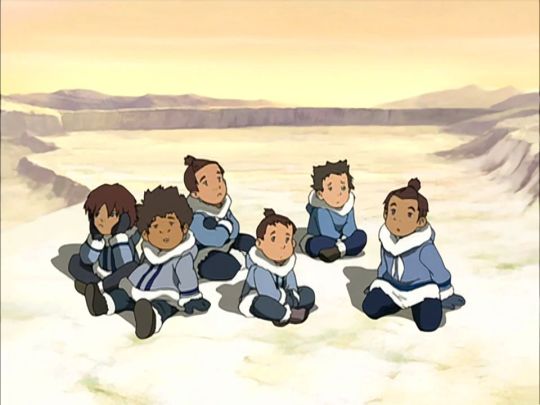
Anotherexcellent question! Sokka’s quest for identity is intrinsically linked to hisquest for manliness, because if you’ll recall, Sokka was not able to become aman by Water Tribe custom before he was nominally put in charge of the tribe:
Bato: How aboutyou, Sokka? You must have some good stories from your first time ice-dodging?Katara: He never got to go. Dad left before he was old enough.Bato: Oh, I forgot, you were too young.Aang: What’s ice-dodging?Bato: It’s a rite of passage for young water tribe members.
But while Katara was helping with the chores, keeping her familytogether and helping to deliver babies, Sokka was left adrift, without apaternal example to emulate for two of his teenage years. War never came to hisdoorstep, so he resorts to “training” the kindergarten crowd. And notice thatKatara (and likely the other members of his tribe) don’t take this seriously:
Katara: Ugh, I’membarrassed to be related to you! Ever since Mom died I’ve been doing all thework around camp while you’ve been off playing soldier!
Playing soldier.Katara’s right: that’s exactly what Sokka has been doing, because therigid gender expectations of being a man don’t allow him to do anything else.Once Aang arrives and upends Sokka’s world, his identity as a would-be mancollides with the reality of the war and the people around him.
The Four Partsof Being a Man (by Sokka)
1. Leader
Sokka : Iknow you all want to fly, but my instincts tell me we should play it safe thistime and walk.Katara: Who made you the boss?Sokka: I’m not the boss—I’m the leader.Katara : You’re the leader? But your voice still cracks!Sokka: I’m the oldest and I’m a warrior. So…I’m the leader!

Katara: You’rehurt. Badly. You can’t fight anymore. Hakoda: Everyone’s counting on me to lead this mission, Katara. Iwon’t let them down. Sokka: Can’t you heal him any faster? Katara: I’m doing everything I can. Sokka: I’ll do it.Katara: No offense Sokka but you’re not exactly Mr. Healing Hands.Sokka: No. I’ll lead the invasion force. Katara: Don’t be crazy, Sokka.Sokka: Maybe I am a little crazy but the eclipse is about to start andwe need to be up that volcano by the time it does.Hakoda: You can do this. I’m proud of you, son. Katara: I still think you’re crazy but I’m proud of you too.
Sokka’s father is the chief, so it makes sense that being a man impliesbeing a leader. But before his adventure, Sokka has only a nebulous idea ofwhat that really means. Worse, he seems to think that being a man makes him aleader, instead of being a leader making him a man. When he first tries toassert his authority in “Jet”, he is met with ridicule:
Aang: Walking stinks!How do people go anywhere without a flying bison?Katara: I don’t know Aang. Why don’t you ask Sokka’s instincts—theyseem to know everything.Sokka: Ha ha. Very funny.Aang: I’m tired of carrying this pack.Katara: You know who you should ask to carry it for a while?Sokka’s Instincts!Aang: That’s a great idea! Hey, Sokka’s Instincts, would you mind—Sokka: Okay, okay—I get it.
As so often happens, Sokka has to adapt to the situation. “Jet” is abouta boy who, although a good leader in most senses, leads his team astray intomurder and mayhem. Sokka, even though he is a novice, realizes innocent livesare on the line and warns the townspeople before the dam explodes. He didn’texpect to be a leader at the moment, but he didn’t fail when it really mattered.Throughout the series, his tactical and strategic successes accumulate untilthe entire GAang relies on him to plan their missions. And on “The Day of BlackSun”, despite his fumbling speech beforehand, Sokka takes the reins of themission and performs admirably.
Aang: It’s over.The Fire Lord is probably long gone. Far away on some remote island where he’llbe safe during the eclipse.Sokka: No. My instincts tell me he wouldn’t go too far. He would have asecret bunker. Somewhere he could go so it’ll be safe during a siege but stillbe close enough to lead his nation.Toph: If it’s an underground secret bunker we’re looking for, I’m justthe girl to find it.
No one’s laughing at Sokka’s instinctsnow.
2. Protector

Katara :Sokka, you’re making a mistake. Sokka: No! I’m keeping my promise to Dad. I’m protecting you fromthreats like him!
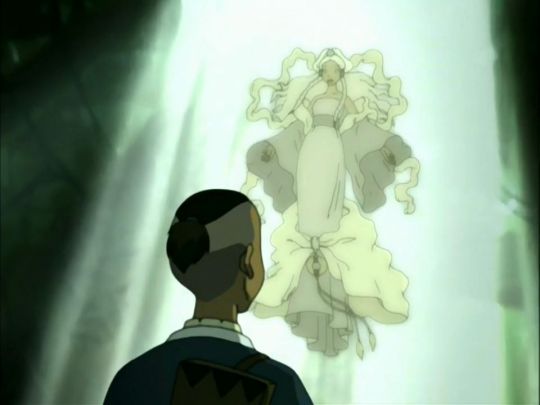
Illusion Yue: You didn’t protect me.
Sokka’smother was murdered when he was very young, and there was nothing he could doabout it. He knows from how devastated his father was and how driven he becameto help the war effort that being a man must mean protecting people—especially the women in your life. Sokkaprotects Katara on multiple occasions from threats real (Jet, Mai) and imagined(Aang, Appa). Protecting Katara is his way of protecting the mother he couldn’tsave as a boy. And his inability to protect Yue from sacrificing herself cutshim deeply. He overcompensates by trying to shield Suki from everything:
Suki: Look,I know you’re just trying to help, but I can take care of myself. Sokka: I know you can. Suki: Then why are you acting so over protective?Sokka: It’s so hard to lose someone you care about. Somethinghappened at the North Pole, and I couldn’t protect someone. I don’t wantanything like that to ever happen again.
In the end,Sokka learns how to be protect the people he cares about without stifling them.His shielding of Toph in the finale is very similar to his protecting Katara inthe pilot:

But there’sone key difference: in the pilot, Sokka thought of Katara as someone who ismore in need of protection as a girl. In the finale, Sokka recognizes that Tophcan’t see the falling shards of metal, but respects her fighting ability overand over:
Sokka: Did Imention how sweet it was that you invented metalbending?
Sokka: I am soglad we added you to the group!
3. Warrior
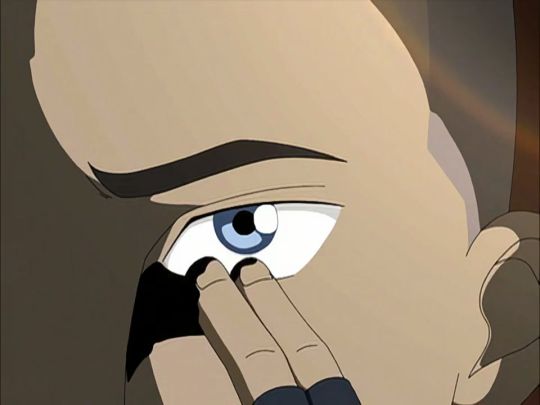


Even morethan being a leader, being a warrior defines being a man in the Water Tribe.And no wonder; with decades of being raided by the ruthless Fire Nation, andwaterbenders being increasingly scarce, the South would have had to rely moreand more on brute strength to drive off the invaders. A warrior is also the onething Sokka is most insecure about because it implies a certain skillset thathe was too young to receive full training in. Not to mention, his sister is awaterbender and he is not. Witness this exchange from “The Warriors of Kyoshi”:
Sokka: Whoare you? Where are the men who ambushed us? Suki: There were no men. We ambushed you. Nowtell us, who are you and what are you doing here? Sokka: Wait a second, there’s no way that a bunch of girls took usdown.
Althoughgender roles are fairly rigid in the Southern Water Tribe, the Sokka from thevery beginning of the series feels an especially constant need to reinforce being awarrior as a “manly” pursuit and puts Katara down for being a girl. I am remindedof Iroh’s speech to Zuko:
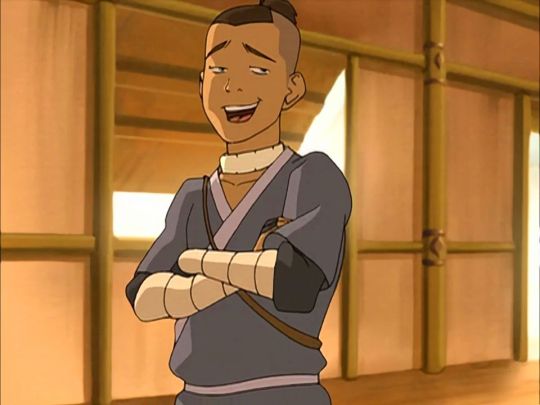
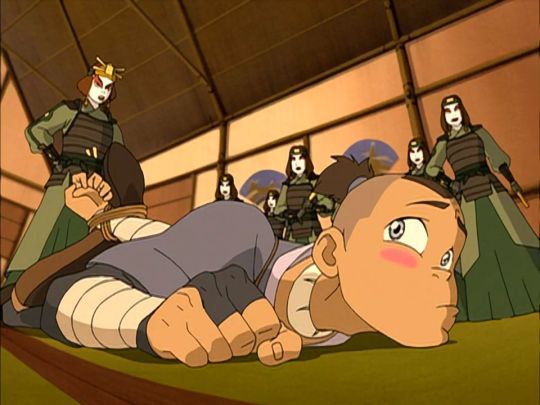
Iroh: Prince Zuko,pride is not the opposite of shame, but its source.

Iroh: Truehumility is the only antidote to shame.
Sokka’s status as a nonbender is oftena source of shame for him. He is treated differently by bending masters:
Master Pakku: Sokka. Take care, son.
And even his own teammates:
Toph: We can take‘em. Three on three.Sokka: Actually, Toph, there’s four of us.Toph: Oh. I’m sorry, I didn’t count you. You know, no bending and all.Sokka: I can still fight!Toph: Okay. Three on three plus Sokka.
This leads him to act proud of hismanliness, an attribute that he needs no training or bending to have. He eventries to get Aang to act “manlier” and not answer to “Twinkletoes”. In the end,though, he confesses the truth about how he feels:
Sokka: Look, Iappreciate the effort, but the fact is each of you is so amazingand so special, and I’m not. I’m just the guy in the groupwho’s regular.
But Sokka isspecial, and as the series goes on, he proves his mettle with a balance ofoutlandish inventiveness and logical practicality:
Sokka: See, theproblem with the old war balloon was you could get it airborne, but once youdid, it just kept going. You could put a hole in the top, but then allthe hot air would escape. So the question became, how do you keep a lid on hotair? Katara: Ugh, if only we knew. Sokka: A lid is actually the answer. If you control the hot air, youcontrol the war balloon. Katara: Hmm. That’s actually pretty smart.
Sokka: I need a plan of this machine. Some schematics that showwhat the inside looks like. Then we can find it’s weak points. Aang: Where are we gonna get something like that What are youdoing! Someone’s gonna hear us! Sokka: That’s the point. I figure a machine this big needsengineers to run it, and when something breaks…Katara: They come to fix it.
He overcomes his insecurities as a warrior by being true to himself.
Piandao: Sokka,when you first arrived, you were so unsure. You even seemed down on yourself.But I saw something in you right away. I saw a heart as strong as a lionturtle, and twice as big. And as we trained, it wasn’t your skills thatimpressed me. No, it certainly wasn’t your skills. You showedsomething beyond that. Creativity, versatility, intelligence… these arethe traits that define a great swordsman. And these are the traits that defineyou. You told me you didn’t know if you were worthy, but I believe thatyou are more worthy than any man I have ever trained.
4. Father


Sokka can show how brave he is, how creativehe is, and how much of a leader he’s become. But in the end, he measures hisidentity as a man by his father’s example:
Aang:Sokka, that speech wasn’t your moment of truth. That was just publicspeaking and nobody’s really good at that.Sokka: My Dad is. He explained the plan perfectly and inspired everyone.Like a real leader should. Aang: Look, your moment of truth isn’t going to be in front of some map.It’s going to be out there, on the battlefield.
Unlike with Zuko, Sokka’s confidence in hisfather is fully justified. As he grows and matures, he becomes, not a copy ofhis father, but his own person. He learns that he can be a warrior withoutputting others down, and he can assert authority without being pigheaded. Hecan trust in his own abilities, regardless of how skilled everyone else isaround him. And Hakoda validates Sokka’s identity in every respect.
As a protector:
Hakoda: Sokka…Sokka: I’m coming with you.Hakoda: You’re not old enough to go to war, Sokka, you know that.Sokka: I’m strong! I’m brave! I can fight! Please, Dad!Hakoda: Being a man is knowingwhere you’re needed the most, and for you right now that’s here protecting yoursister.Sokka: I don’t understand.Hakoda: Someday you will. I’m going to miss you so much.
As a warrior:
Hakoda: Ready togo knock some Fire Nation heads?Sokka: You don’t know how much this means to me dad. I’ll make youproud, and I’ll finally prove to you what a great warrior I am.Hakoda: Sokka, you don’t have to prove anything to me. I’m already proud of you, and I’ve alwaysknown you were a great warrior.Sokka: Really?Hakoda: Why do you think I trusted you to look after our tribe when Ileft?
As a leader:
Sokka:No. I’ll lead the invasion force. Katara: Don’t be crazy, Sokka.Sokka: Maybe I am a little crazy but the eclipse is about to start andwe need to be up that volcano by the time it does.Hakoda: You can do this.I’m proud of you, son.
And as a man.
Hakoda: Bato, getthese mines loaded up. The rest of you men, prepare for battle! Sokka: Uh, what should I do, Dad?Hakoda: Aren’t you listening? I said the rest of you men get ready for battle.
Sokka willbe a fantastic father to his own children someday, no matter what LOK might imply.
357 notes
·
View notes
Text
On Mobile; long post
LISTEN. I need Tigress to confront Shifu. I need her to get her apology she deserves, she DESERVES closure.
I keep imagining her feeling like something is missing, she feels at loss. She happy at the palace and accepted everything they went through but she still has thoughts about things.
SO SHE GOES TO THE SOOTHSAYER. She travels there for answers, she doesn’t know why but she just feels drawn back to gongmen city. And the Soothsayer knows and has been waiting for her but it takes tigress a moment to open up. She dances around it “I.. just needed a break.” the soothsayer just smiles and offers her time. They have tea and the soothsayer talks a bit about her past, allowing Tigress to slowly become more comfortable with the situation.
One of those nights, Tigress is alone and staring outside her room. Always horrified about failure, always thinking about how she can be better. Finally she goes to the soothsayer and asks her how she can achieve inner peace like po. She tells her it doesn’t always come so easy. So how can she move forward on gaining it? She has no desire to know if there are more like her.
She doesn’t care if she has anyone with the same blood as her, out there. She doesn’t understand. What does she want, why can’t she understand herself, why are these things so hard for her, how come shes never good enough? she shouts, obviously frustrated. and the soothsayer tells her that she didn’t come for answers, because the answers she needs can’t be given to tigress by her. But perhaps she came for someone to say it was okay to seek the answers she wants from someone else.
Tigress falls to the ground in defeat and tells her she doesn’t want to be like /him/. All she ever wanted to do was be good enough and give shifu peace for what happened, but she couldn’t even do that. And the soothsayer tells her its not her fault, she did nothing wrong. Its okay to want closure for things that happened.
Who is she? Is asked. She thinks about the orphanage, when she called herself a monster. To when she was a teen and defeated the boar. I am a tiger, I am a friend, I’m a warrior who protects all. I’m strong. I am Tigress.
And then she leaves, back to the valley of peace.
When she arrives the villages step aside and she walks towards the jade palace. Mr. Ping noticed her and runs beside her, she stops “Tigress! You’re back! Welcome home, oh you know who has been waiting impatiently for you to return, he’s home right now, why not come sit and eat?” She thanks him but says theres something she has to do. He asks her what it is.
Mr. Ping goes back home and starts cleaning the kitchen. Po is finally up, he sleepily walks down the stairs, stomach growling. “Ah po! Finally you’re up, we have to start cooking, Tigress and shifu will be very hungry after their fight.” Po yawns “yeeaaauhhh WAIT WHAT”. Po asks his dad what he means Mr. Pings like yeah yeah of course you have to help cook. It’s been a few weeks since they saw her they have to make it special. Pos like wait dad shes fighting shifu what do you mean. “Po i told you already!!! Tigress is home” pos like WHAT DO YOU MEAN WHEN DID YOU TALK TO HER. “About twenty minutes ago she headed straight for the jade palace”.
Shifu is having tea in the outside training area. Right where the furious five were made a team to train at the palace all those years ago. Tigress comes falling down right before the table he sits at. Shes glaring at him. “Ah master tigress, you’re back. Did you have a nice break?” I demand a fight master, she tells him. Shifus ear twitches, and asks her if she would like to talk about her break first before it. She replies no. Very well he tells her, they both get into their battle stance.
Tigress strikes first and they start to fight. Eventually po tries to step in and stop them but tigress picks him up with one hand and throws him saying “not now po” and shifu says its between them. The rest of the five watching from afar with shock.
In the end, tigress gets the upper hand, and is towering over shifu paralleling tai lung but she stops. She steps up and says shes better than tai lung, shes always been better than him, and she deserved better than how he treated her. How could he not see that everything in her life was always done to receive his approval? To make him proud. He apologizes to her while looking down, and tells her that his past failures stopped him from making a better future.
Tigress tells him that she was one of the good things that happened to him (shifu). So maybe he wasnt horribly off. She thought she could never be good enough. She felt like she could never come to terms with everything, but it was herself who needed to be brave enough to close the door instead of waiting for him to do it. She needed to accept herself and see that she didnt need his approval.
This has always been pictures in comic format happening, so fast forward to a few months with tigress standing underneath the peach tree and then she sits down to have a cup of tea with shifu.
#its been sitting in my notes for like a week now#txt post#long post#headcanons#not written down perfectly bc its a constant stream of thoughts basically
53 notes
·
View notes
Text
Is AA Too Religious for Generation Z?
Are today’s mutual-aid recovery groups ready to satisfy Generation-next?“More than any other generation before them, Gen Z does not assert a religious identity. They might be drawn to things spiritual, but with a vastly different starting point from previous generations, many of whom received a basic education on the Bible and Christianity. And it shows: The percentage of Gen Z that identifies as atheist is double that of the U.S. adult population.”Released early this year, Barna Group’s Generation-Z Report (Americans born between 1999 and 2015) surveyed over 2,000 13 to 18-year-olds. The oldest of this generation turn 20 in 2019.According to AA’s most recent triennial membership survey, 1% of AA is under 21—that’s about 20,000 sober teenagers in AA rooms right now. What’s my personal affinity with this demographic? It’s two-fold: I have two millennial children and one 18-year-old stepson; secondly, while I am a grey-haired Baby Boomer, I was a teen at my first 12-step meeting. My 20th birthday was 1980, three months shy of my fourth anniversary clean and sober.I was a second-generation AA member and—like Barna’s youth focus group—my worldview seemed incompatible with the old fogies of 12-step rooms. My mother mused about finding god’s will for her from meditation or her daily horoscope. She was such a Virgo, you know. Horoscopes, higher powers, legends of Sasquatch, these were all fictional symbols as far as I was concerned. Reasonable people didn’t take such constructs literally, did they?Bob K, like me, is a second-generation AA. He’s currently between historical book projects; Key Players in AA History will soon have a prequel. Bob’s follow-up research will produce a book about pre-AA addiction and treatment. At age 40, Bob made it into AA as a result of his dad 12-stepping him. He also was uncomfortable with the emphasis on "God." “When I was a month sober, it was ‘God-this, God saved me’ and I was going to put my resignation in. I didn’t think I could stand it in AA any longer. I went to the internet of the day—which back then was the library—and I looked for non-religious alternatives to AA. They had them in California but nothing in Ontario Canada. So it was AA or nothing. If I tried to brave it alone, I’d be drunk; I knew it.”Today, Bob enjoys the likeminded company at his Secular AA home group, Whitby Freethinkers, which meets in the local suburban library just East of Toronto. If I were confronting addiction/recovery as a teen today, I wonder if I would go to AA or NA? If AA was once “the last house on the block,” today it’s one house in a subdivision of mutual-aid choices. Today, newcomers have access to Refuge Recovery, SMART Recovery, Secular Organizations for Sobriety (SOS), or Medically Assisted Treatment, none of which existed in the 1970s.On Practically Sane, therapist Jeffrey Munn states: “I like to take a practical approach … I’m not a fan of the ‘fluff’ and flowery language that is often associated with the world of psychology and self-help.” Jeffrey came into the rooms at 20, stayed sober for 2 ½ years, relapsed, came back and is now 13 years clean and sober.“I was mandated to three 12-step meetings per week to stay in the program I was in. Since I was young I have been agnostic. I wanted to find a higher power that was common sense-based, but in the rooms I felt pulled towards a more dogmatic spiritual idea of higher power. Back then, I needed to come up with my own conception of what was happening on a psychological level." Recently, Jeffrey wrote and published Staying Sober Without God: the Practical 12 Steps to Long Term Recovery from Alcoholism and Addiction.“I looked at SMART Recovery,” Jeffrey tells The Fix. “I looked at Moderation Management, too—that one struck me as being an organized resentment against AA—I wasn’t feeling it. When it comes down to social support and a practical plan of action, it’s hard to beat 12-step programs. What I try to teach is: if you don’t buy into any kind of a supernatural higher power, navigate the 12-step world, filtering the god-stuff out, working the program in your own way; there is lots that really works.”Barna reports, “Nearly half of teens, on par with Millennials, say, ‘I need factual evidence to support my beliefs.’” Jeffrey hopes Staying Sober Without God—which joins a growing secular 12-step recovery offering—offers the rational narrative today’s youth crave. Barna calls today’s youth “the first truly post-Christian generation [in America].”Certified Master Addiction Counselor David B. Bohl of Milwaukee understands the value of other-oriented care. David tells The Fix: “As head of a 20-bed coed dual-diagnosis treatment center, emerging adults, 18 to 25 years old, came into our care. I wouldn’t say that they universally shrugged off the 12-step approach but almost universally, in reaction to our volunteers, alumni, and traditional AA community, younger clients didn’t want what the volunteers and alumni had. And I wouldn’t say it was the religiosity always. Sometimes it was an age-thing or life approach. So, our recovery management function became that much more important in terms of building individualized treatment that suits everyone.“In the USA, 75% of all residential treatment centers identify as 12-step facilitators,” David tells us. “In the simplest form, our job is to introduce people to the language and the concept of the 12 steps and then to introduce the clients to support groups or people in support groups when they are discharged from acute care.Where trauma is involved—religious trauma in particular—traditional AA language and rituals trigger that shame they feel from negative formal religion experiences.”Let’s put this overbearing religion caution to a real-life test: Suwaida F was the second oldest of 11 children to Somalian refugee parents who fled to Canada in the 1980s.“In Kindergarten I didn’t have to wear a hijab; my parents weren’t super religious. I went to an Islamic school in grade one. It was normal for teachers to have belts with them, they would hit you; child abuse was normalized. They didn’t really teach us that much math, science, history. The Islamic teachers weren’t that educated. My parents took me out and put me in public school. Then, some of my mom’s Somalian-Canadian friends started moving their kids to Egypt. My friends would stay in Egypt two years, finish the Qur’an and the girls came back wearing burqas and head-scarves. Some Muslim friends would come to school in their hijab, take them off and put them back on when they went home. We called them The Transformers.My parents really wanted us to learn the Qur’an; I don’t speak Arabic, so it was difficult. And I never believed it. I asked my mom and dad, ‘How do you know that this stuff is real?’ They got frustrated and mad and said, ‘Don’t ever ask that question again.’ I knew it wasn’t real. Mom got more and more religious. Pictures of her at age 19 -- she wore no head-scarf when she was my age. My mom expected me to be religious and I rebelled. I had to leave home.”Suwaida misses her sisters. She feels unwelcome in the family home unless she is dressed in the Islamic custom and that wouldn’t be true to herself. Away from home, Suwaida found the welcoming community she craved in the booze and cocaine culture.“It wasn’t a matter of having no money; I had no sense of hope. People at work didn’t know I was hopped from shelter to shelter at night. One winter I was told, ‘Suwaida, you’ve been restricted from every youth shelter in the city of Toronto.’” As addiction progressed, Suwaida recalls an ever-descending patterns of compromises, bad relationships and regrets.“Today, it’s like I still never unpack my suitcase; I’m always ready to go.” During a stay at St. Joe’s detox, Suwaida went to her first NA meeting.“At 7 PM, a woman spoke. I made it clear that I thought it was stupid; I wouldn’t share. At the end, everyone was holding hands to pray and I said, ‘I’m not holding any of your hands.’ I didn’t go back. When I was discharged, I went drinking at the bar with my suitcase, not knowing where I was going to stay that night.My second meeting I consider my first, because I chose it. I thought I should go to AA. I googled atheist or freethinker AA to avoid a repeat of my NA experience. I found Beyond Belief Agnostics and Freethinkers Group on the University of Toronto campus. I went there last February. For a while, I had wine in my travel-mug, and I didn’t say anything. In August I felt like the woman beside me knew I was drinking, and I ask myself, ‘What am I doing?’ So, my next meeting, I went sober. I’ve been clean and sober ever since.”Despite the child-violence of Islamic school and rejection from her family, Suwaida isn’t anti-theist. “I do believe in God or in something. I feel like I’m always looking for signs. I don’t believe in a god in the sky but to say there’s nothing beyond all this doesn’t make any sense to me. Sometimes the freakiest things happen. Maybe it’s because I’m a storyteller, I try to make a story out of everything; you think of someone, then they phone you, is that random?I feel a part-of in secular or mainstream AA meetings. My self-talk still sounds like, ‘Don’t share Suwaida, you have nothing to add.’ Maybe it comes from not being able to express myself when I was growing up. I have no sense of self. I guess I have something special to offer but I don’t know how to articulate it. It’s hard; I have limited self-confidence.”“Give them their voice; listen to them,” is Kevin Schaefer’s approach. He co-hosts the podcast Don’t Die Wisconsin. He’s also a recovery coach.“I’ve been in Recovery 29+ years. I’m a substance abuse counselor and I got into addiction treatment through sober living. When I started working in a Suboxone clinic, I came to realize that AA can’t solve everything. I always come from a harm reduction standpoint: meth, cocaine, benzos; I ask, ‘Can you just smoke pot?’ and we start building the trust there.Medically Assisted Treatment (MAT) is geared towards this generation. Most kids coming through my door know a lot about MAT, more so than people in AA with the biases and stigma that they bring. Kids sometimes know more than the front-line social workers. Their friends are on MAT, that’s how they gather their information (not to say their information is all correct). But a lot of therapists don’t understand medication. Medication can be a ticket to survival out on the streets.”The Fix asked Kevin his opinion on the best suited mutual-aid group for this generation.“Most of the generation you’re talking about walks in with anxiety and defiantly won’t do groups.” We talked about the role of online video/voice or text meetings for a tech-native generation. “Yes—where appropriate. Women especially, because from what I’ve seen, most females have suffered from trauma. I have heard women who prefer online recovery; that make sense to me. I’ve been to InTheRooms.com; as professionals we have a duty to know what’s out there. And there are some crazies online.If someone has an Eastern philosophy bent, I’ll send them to Refuge Recovery; I’ve been there. If I can, I’ll set them up with somebody that I know can help them. And let’s not forget that some youth, if Christianity is your thing, Celebrate Recovery is amazing — talk about a community that wraps themselves around the substance user. There are movie nights, food, all kinds of extracurricular activities. The SMART Recovery Movement? Excellent. SMART momentum is building in Milwaukee. They are goal-oriented and the person gets supported whether they’re on Suboxone or, in one case I know, micro-dosing with LSD for depression; they’ll be supported either way. My goal with youth is: ‘Try to get to one meeting this month; start slow.’ Don’t set the bar too high and if they enjoy it, then great.The 12-step meeting I go to, it’s a men’s meeting. There are people there on medication and they don’t get blow-back. I wish more of AA was like this. When I came in, almost 30 years ago now, I saw all the God-stuff on the walls and I thought, ‘Nah, this isn’t going to work’ but thank G… (laughs), thank the Group of Drunks who said, ‘You don’t have to believe in that.’ The range in my meeting is broad—Eastern philosophy, Native American practices, Yoga, I was invited to Transcendental Meditation meetings at members’ houses. I was fortunate to fall into this group. You know, the first book my sponsor gave me was The Tao of Physics—not The Big Book—it was this 70’s book with Buddhism, Taoism, Hinduism, correlated to physics and contemporary science.”So, as to the question that kicked this off, some mutual aid meetings are ready to meet the taste of a new generation; results may vary. Who’s heard: “If you haven’t met anyone you don’t like in AA, you haven’t gone to enough meetings”?The reverse is true, also. If the peer-to-peer meetings I’ve sampled seem too narrow or dogmatic, maybe my search for just the right fit isn’t over. And if I don’t want a face-to-face meeting, there’s always Kevin’s podcast, virtual communities like The Fix, or I can order one of Bob or David or Jeffrey’s books if that’s more to my taste.
0 notes
Text
Is AA Too Religious for Generation Z?
Are today’s mutual-aid recovery groups ready to satisfy Generation-next?“More than any other generation before them, Gen Z does not assert a religious identity. They might be drawn to things spiritual, but with a vastly different starting point from previous generations, many of whom received a basic education on the Bible and Christianity. And it shows: The percentage of Gen Z that identifies as atheist is double that of the U.S. adult population.”Released early this year, Barna Group’s Generation-Z Report (Americans born between 1999 and 2015) surveyed over 2,000 13 to 18-year-olds. The oldest of this generation turn 20 in 2019.According to AA’s most recent triennial membership survey, 1% of AA is under 21—that’s about 20,000 sober teenagers in AA rooms right now. What’s my personal affinity with this demographic? It’s two-fold: I have two millennial children and one 18-year-old stepson; secondly, while I am a grey-haired Baby Boomer, I was a teen at my first 12-step meeting. My 20th birthday was 1980, three months shy of my fourth anniversary clean and sober.I was a second-generation AA member and—like Barna’s youth focus group—my worldview seemed incompatible with the old fogies of 12-step rooms. My mother mused about finding god’s will for her from meditation or her daily horoscope. She was such a Virgo, you know. Horoscopes, higher powers, legends of Sasquatch, these were all fictional symbols as far as I was concerned. Reasonable people didn’t take such constructs literally, did they?Bob K, like me, is a second-generation AA. He’s currently between historical book projects; Key Players in AA History will soon have a prequel. Bob’s follow-up research will produce a book about pre-AA addiction and treatment. At age 40, Bob made it into AA as a result of his dad 12-stepping him. He also was uncomfortable with the emphasis on "God." “When I was a month sober, it was ‘God-this, God saved me’ and I was going to put my resignation in. I didn’t think I could stand it in AA any longer. I went to the internet of the day—which back then was the library—and I looked for non-religious alternatives to AA. They had them in California but nothing in Ontario Canada. So it was AA or nothing. If I tried to brave it alone, I’d be drunk; I knew it.”Today, Bob enjoys the likeminded company at his Secular AA home group, Whitby Freethinkers, which meets in the local suburban library just East of Toronto. If I were confronting addiction/recovery as a teen today, I wonder if I would go to AA or NA? If AA was once “the last house on the block,” today it’s one house in a subdivision of mutual-aid choices. Today, newcomers have access to Refuge Recovery, SMART Recovery, Secular Organizations for Sobriety (SOS), or Medically Assisted Treatment, none of which existed in the 1970s.On Practically Sane, therapist Jeffrey Munn states: “I like to take a practical approach … I’m not a fan of the ‘fluff’ and flowery language that is often associated with the world of psychology and self-help.” Jeffrey came into the rooms at 20, stayed sober for 2 ½ years, relapsed, came back and is now 13 years clean and sober.“I was mandated to three 12-step meetings per week to stay in the program I was in. Since I was young I have been agnostic. I wanted to find a higher power that was common sense-based, but in the rooms I felt pulled towards a more dogmatic spiritual idea of higher power. Back then, I needed to come up with my own conception of what was happening on a psychological level." Recently, Jeffrey wrote and published Staying Sober Without God: the Practical 12 Steps to Long Term Recovery from Alcoholism and Addiction.“I looked at SMART Recovery,” Jeffrey tells The Fix. “I looked at Moderation Management, too—that one struck me as being an organized resentment against AA—I wasn’t feeling it. When it comes down to social support and a practical plan of action, it’s hard to beat 12-step programs. What I try to teach is: if you don’t buy into any kind of a supernatural higher power, navigate the 12-step world, filtering the god-stuff out, working the program in your own way; there is lots that really works.”Barna reports, “Nearly half of teens, on par with Millennials, say, ‘I need factual evidence to support my beliefs.’” Jeffrey hopes Staying Sober Without God—which joins a growing secular 12-step recovery offering—offers the rational narrative today’s youth crave. Barna calls today’s youth “the first truly post-Christian generation [in America].”Certified Master Addiction Counselor David B. Bohl of Milwaukee understands the value of other-oriented care. David tells The Fix: “As head of a 20-bed coed dual-diagnosis treatment center, emerging adults, 18 to 25 years old, came into our care. I wouldn’t say that they universally shrugged off the 12-step approach but almost universally, in reaction to our volunteers, alumni, and traditional AA community, younger clients didn’t want what the volunteers and alumni had. And I wouldn’t say it was the religiosity always. Sometimes it was an age-thing or life approach. So, our recovery management function became that much more important in terms of building individualized treatment that suits everyone.“In the USA, 75% of all residential treatment centers identify as 12-step facilitators,” David tells us. “In the simplest form, our job is to introduce people to the language and the concept of the 12 steps and then to introduce the clients to support groups or people in support groups when they are discharged from acute care.Where trauma is involved—religious trauma in particular—traditional AA language and rituals trigger that shame they feel from negative formal religion experiences.”Let’s put this overbearing religion caution to a real-life test: Suwaida F was the second oldest of 11 children to Somalian refugee parents who fled to Canada in the 1980s.“In Kindergarten I didn’t have to wear a hijab; my parents weren’t super religious. I went to an Islamic school in grade one. It was normal for teachers to have belts with them, they would hit you; child abuse was normalized. They didn’t really teach us that much math, science, history. The Islamic teachers weren’t that educated. My parents took me out and put me in public school. Then, some of my mom’s Somalian-Canadian friends started moving their kids to Egypt. My friends would stay in Egypt two years, finish the Qur’an and the girls came back wearing burqas and head-scarves. Some Muslim friends would come to school in their hijab, take them off and put them back on when they went home. We called them The Transformers.My parents really wanted us to learn the Qur’an; I don’t speak Arabic, so it was difficult. And I never believed it. I asked my mom and dad, ‘How do you know that this stuff is real?’ They got frustrated and mad and said, ‘Don’t ever ask that question again.’ I knew it wasn’t real. Mom got more and more religious. Pictures of her at age 19 -- she wore no head-scarf when she was my age. My mom expected me to be religious and I rebelled. I had to leave home.”Suwaida misses her sisters. She feels unwelcome in the family home unless she is dressed in the Islamic custom and that wouldn’t be true to herself. Away from home, Suwaida found the welcoming community she craved in the booze and cocaine culture.“It wasn’t a matter of having no money; I had no sense of hope. People at work didn’t know I was hopped from shelter to shelter at night. One winter I was told, ‘Suwaida, you’ve been restricted from every youth shelter in the city of Toronto.’” As addiction progressed, Suwaida recalls an ever-descending patterns of compromises, bad relationships and regrets.“Today, it’s like I still never unpack my suitcase; I’m always ready to go.” During a stay at St. Joe’s detox, Suwaida went to her first NA meeting.“At 7 PM, a woman spoke. I made it clear that I thought it was stupid; I wouldn’t share. At the end, everyone was holding hands to pray and I said, ‘I’m not holding any of your hands.’ I didn’t go back. When I was discharged, I went drinking at the bar with my suitcase, not knowing where I was going to stay that night.My second meeting I consider my first, because I chose it. I thought I should go to AA. I googled atheist or freethinker AA to avoid a repeat of my NA experience. I found Beyond Belief Agnostics and Freethinkers Group on the University of Toronto campus. I went there last February. For a while, I had wine in my travel-mug, and I didn’t say anything. In August I felt like the woman beside me knew I was drinking, and I ask myself, ‘What am I doing?’ So, my next meeting, I went sober. I’ve been clean and sober ever since.”Despite the child-violence of Islamic school and rejection from her family, Suwaida isn’t anti-theist. “I do believe in God or in something. I feel like I’m always looking for signs. I don’t believe in a god in the sky but to say there’s nothing beyond all this doesn’t make any sense to me. Sometimes the freakiest things happen. Maybe it’s because I’m a storyteller, I try to make a story out of everything; you think of someone, then they phone you, is that random?I feel a part-of in secular or mainstream AA meetings. My self-talk still sounds like, ‘Don’t share Suwaida, you have nothing to add.’ Maybe it comes from not being able to express myself when I was growing up. I have no sense of self. I guess I have something special to offer but I don’t know how to articulate it. It’s hard; I have limited self-confidence.”“Give them their voice; listen to them,” is Kevin Schaefer’s approach. He co-hosts the podcast Don’t Die Wisconsin. He’s also a recovery coach.“I’ve been in Recovery 29+ years. I’m a substance abuse counselor and I got into addiction treatment through sober living. When I started working in a Suboxone clinic, I came to realize that AA can’t solve everything. I always come from a harm reduction standpoint: meth, cocaine, benzos; I ask, ‘Can you just smoke pot?’ and we start building the trust there.Medically Assisted Treatment (MAT) is geared towards this generation. Most kids coming through my door know a lot about MAT, more so than people in AA with the biases and stigma that they bring. Kids sometimes know more than the front-line social workers. Their friends are on MAT, that’s how they gather their information (not to say their information is all correct). But a lot of therapists don’t understand medication. Medication can be a ticket to survival out on the streets.”The Fix asked Kevin his opinion on the best suited mutual-aid group for this generation.“Most of the generation you’re talking about walks in with anxiety and defiantly won’t do groups.” We talked about the role of online video/voice or text meetings for a tech-native generation. “Yes—where appropriate. Women especially, because from what I’ve seen, most females have suffered from trauma. I have heard women who prefer online recovery; that make sense to me. I’ve been to InTheRooms.com; as professionals we have a duty to know what’s out there. And there are some crazies online.If someone has an Eastern philosophy bent, I’ll send them to Refuge Recovery; I’ve been there. If I can, I’ll set them up with somebody that I know can help them. And let’s not forget that some youth, if Christianity is your thing, Celebrate Recovery is amazing — talk about a community that wraps themselves around the substance user. There are movie nights, food, all kinds of extracurricular activities. The SMART Recovery Movement? Excellent. SMART momentum is building in Milwaukee. They are goal-oriented and the person gets supported whether they’re on Suboxone or, in one case I know, micro-dosing with LSD for depression; they’ll be supported either way. My goal with youth is: ‘Try to get to one meeting this month; start slow.’ Don’t set the bar too high and if they enjoy it, then great.The 12-step meeting I go to, it’s a men’s meeting. There are people there on medication and they don’t get blow-back. I wish more of AA was like this. When I came in, almost 30 years ago now, I saw all the God-stuff on the walls and I thought, ‘Nah, this isn’t going to work’ but thank G… (laughs), thank the Group of Drunks who said, ‘You don’t have to believe in that.’ The range in my meeting is broad—Eastern philosophy, Native American practices, Yoga, I was invited to Transcendental Meditation meetings at members’ houses. I was fortunate to fall into this group. You know, the first book my sponsor gave me was The Tao of Physics—not The Big Book—it was this 70’s book with Buddhism, Taoism, Hinduism, correlated to physics and contemporary science.”So, as to the question that kicked this off, some mutual aid meetings are ready to meet the taste of a new generation; results may vary. Who’s heard: “If you haven’t met anyone you don’t like in AA, you haven’t gone to enough meetings”?The reverse is true, also. If the peer-to-peer meetings I’ve sampled seem too narrow or dogmatic, maybe my search for just the right fit isn’t over. And if I don’t want a face-to-face meeting, there’s always Kevin’s podcast, virtual communities like The Fix, or I can order one of Bob or David or Jeffrey’s books if that’s more to my taste.
from RSSMix.com Mix ID 8241841 http://bit.ly/2B5JhVm
0 notes
Text
Is AA Too Religious for Generation Z?
Are today’s mutual-aid recovery groups ready to satisfy Generation-next?“More than any other generation before them, Gen Z does not assert a religious identity. They might be drawn to things spiritual, but with a vastly different starting point from previous generations, many of whom received a basic education on the Bible and Christianity. And it shows: The percentage of Gen Z that identifies as atheist is double that of the U.S. adult population.”Released early this year, Barna Group’s Generation-Z Report (Americans born between 1999 and 2015) surveyed over 2,000 13 to 18-year-olds. The oldest of this generation turn 20 in 2019.According to AA’s most recent triennial membership survey, 1% of AA is under 21—that’s about 20,000 sober teenagers in AA rooms right now. What’s my personal affinity with this demographic? It’s two-fold: I have two millennial children and one 18-year-old stepson; secondly, while I am a grey-haired Baby Boomer, I was a teen at my first 12-step meeting. My 20th birthday was 1980, three months shy of my fourth anniversary clean and sober.I was a second-generation AA member and—like Barna’s youth focus group—my worldview seemed incompatible with the old fogies of 12-step rooms. My mother mused about finding god’s will for her from meditation or her daily horoscope. She was such a Virgo, you know. Horoscopes, higher powers, legends of Sasquatch, these were all fictional symbols as far as I was concerned. Reasonable people didn’t take such constructs literally, did they?Bob K, like me, is a second-generation AA. He’s currently between historical book projects; Key Players in AA History will soon have a prequel. Bob’s follow-up research will produce a book about pre-AA addiction and treatment. At age 40, Bob made it into AA as a result of his dad 12-stepping him. He also was uncomfortable with the emphasis on "God." “When I was a month sober, it was ‘God-this, God saved me’ and I was going to put my resignation in. I didn’t think I could stand it in AA any longer. I went to the internet of the day—which back then was the library—and I looked for non-religious alternatives to AA. They had them in California but nothing in Ontario Canada. So it was AA or nothing. If I tried to brave it alone, I’d be drunk; I knew it.”Today, Bob enjoys the likeminded company at his Secular AA home group, Whitby Freethinkers, which meets in the local suburban library just East of Toronto. If I were confronting addiction/recovery as a teen today, I wonder if I would go to AA or NA? If AA was once “the last house on the block,” today it’s one house in a subdivision of mutual-aid choices. Today, newcomers have access to Refuge Recovery, SMART Recovery, Secular Organizations for Sobriety (SOS), or Medically Assisted Treatment, none of which existed in the 1970s.On Practically Sane, therapist Jeffrey Munn states: “I like to take a practical approach … I’m not a fan of the ‘fluff’ and flowery language that is often associated with the world of psychology and self-help.” Jeffrey came into the rooms at 20, stayed sober for 2 ½ years, relapsed, came back and is now 13 years clean and sober.“I was mandated to three 12-step meetings per week to stay in the program I was in. Since I was young I have been agnostic. I wanted to find a higher power that was common sense-based, but in the rooms I felt pulled towards a more dogmatic spiritual idea of higher power. Back then, I needed to come up with my own conception of what was happening on a psychological level." Recently, Jeffrey wrote and published Staying Sober Without God: the Practical 12 Steps to Long Term Recovery from Alcoholism and Addiction.“I looked at SMART Recovery,” Jeffrey tells The Fix. “I looked at Moderation Management, too—that one struck me as being an organized resentment against AA—I wasn’t feeling it. When it comes down to social support and a practical plan of action, it’s hard to beat 12-step programs. What I try to teach is: if you don’t buy into any kind of a supernatural higher power, navigate the 12-step world, filtering the god-stuff out, working the program in your own way; there is lots that really works.”Barna reports, “Nearly half of teens, on par with Millennials, say, ‘I need factual evidence to support my beliefs.’” Jeffrey hopes Staying Sober Without God—which joins a growing secular 12-step recovery offering—offers the rational narrative today’s youth crave. Barna calls today’s youth “the first truly post-Christian generation [in America].”Certified Master Addiction Counselor David B. Bohl of Milwaukee understands the value of other-oriented care. David tells The Fix: “As head of a 20-bed coed dual-diagnosis treatment center, emerging adults, 18 to 25 years old, came into our care. I wouldn’t say that they universally shrugged off the 12-step approach but almost universally, in reaction to our volunteers, alumni, and traditional AA community, younger clients didn’t want what the volunteers and alumni had. And I wouldn’t say it was the religiosity always. Sometimes it was an age-thing or life approach. So, our recovery management function became that much more important in terms of building individualized treatment that suits everyone.“In the USA, 75% of all residential treatment centers identify as 12-step facilitators,” David tells us. “In the simplest form, our job is to introduce people to the language and the concept of the 12 steps and then to introduce the clients to support groups or people in support groups when they are discharged from acute care.Where trauma is involved—religious trauma in particular—traditional AA language and rituals trigger that shame they feel from negative formal religion experiences.”Let’s put this overbearing religion caution to a real-life test: Suwaida F was the second oldest of 11 children to Somalian refugee parents who fled to Canada in the 1980s.“In Kindergarten I didn’t have to wear a hijab; my parents weren’t super religious. I went to an Islamic school in grade one. It was normal for teachers to have belts with them, they would hit you; child abuse was normalized. They didn’t really teach us that much math, science, history. The Islamic teachers weren’t that educated. My parents took me out and put me in public school. Then, some of my mom’s Somalian-Canadian friends started moving their kids to Egypt. My friends would stay in Egypt two years, finish the Qur’an and the girls came back wearing burqas and head-scarves. Some Muslim friends would come to school in their hijab, take them off and put them back on when they went home. We called them The Transformers.My parents really wanted us to learn the Qur’an; I don’t speak Arabic, so it was difficult. And I never believed it. I asked my mom and dad, ‘How do you know that this stuff is real?’ They got frustrated and mad and said, ‘Don’t ever ask that question again.’ I knew it wasn’t real. Mom got more and more religious. Pictures of her at age 19 -- she wore no head-scarf when she was my age. My mom expected me to be religious and I rebelled. I had to leave home.”Suwaida misses her sisters. She feels unwelcome in the family home unless she is dressed in the Islamic custom and that wouldn’t be true to herself. Away from home, Suwaida found the welcoming community she craved in the booze and cocaine culture.“It wasn’t a matter of having no money; I had no sense of hope. People at work didn’t know I was hopped from shelter to shelter at night. One winter I was told, ‘Suwaida, you’ve been restricted from every youth shelter in the city of Toronto.’” As addiction progressed, Suwaida recalls an ever-descending patterns of compromises, bad relationships and regrets.“Today, it’s like I still never unpack my suitcase; I’m always ready to go.” During a stay at St. Joe’s detox, Suwaida went to her first NA meeting.“At 7 PM, a woman spoke. I made it clear that I thought it was stupid; I wouldn’t share. At the end, everyone was holding hands to pray and I said, ‘I’m not holding any of your hands.’ I didn’t go back. When I was discharged, I went drinking at the bar with my suitcase, not knowing where I was going to stay that night.My second meeting I consider my first, because I chose it. I thought I should go to AA. I googled atheist or freethinker AA to avoid a repeat of my NA experience. I found Beyond Belief Agnostics and Freethinkers Group on the University of Toronto campus. I went there last February. For a while, I had wine in my travel-mug, and I didn’t say anything. In August I felt like the woman beside me knew I was drinking, and I ask myself, ‘What am I doing?’ So, my next meeting, I went sober. I’ve been clean and sober ever since.”Despite the child-violence of Islamic school and rejection from her family, Suwaida isn’t anti-theist. “I do believe in God or in something. I feel like I’m always looking for signs. I don’t believe in a god in the sky but to say there’s nothing beyond all this doesn’t make any sense to me. Sometimes the freakiest things happen. Maybe it’s because I’m a storyteller, I try to make a story out of everything; you think of someone, then they phone you, is that random?I feel a part-of in secular or mainstream AA meetings. My self-talk still sounds like, ‘Don’t share Suwaida, you have nothing to add.’ Maybe it comes from not being able to express myself when I was growing up. I have no sense of self. I guess I have something special to offer but I don’t know how to articulate it. It’s hard; I have limited self-confidence.”“Give them their voice; listen to them,” is Kevin Schaefer’s approach. He co-hosts the podcast Don’t Die Wisconsin. He’s also a recovery coach.“I’ve been in Recovery 29+ years. I’m a substance abuse counselor and I got into addiction treatment through sober living. When I started working in a Suboxone clinic, I came to realize that AA can’t solve everything. I always come from a harm reduction standpoint: meth, cocaine, benzos; I ask, ‘Can you just smoke pot?’ and we start building the trust there.Medically Assisted Treatment (MAT) is geared towards this generation. Most kids coming through my door know a lot about MAT, more so than people in AA with the biases and stigma that they bring. Kids sometimes know more than the front-line social workers. Their friends are on MAT, that’s how they gather their information (not to say their information is all correct). But a lot of therapists don’t understand medication. Medication can be a ticket to survival out on the streets.”The Fix asked Kevin his opinion on the best suited mutual-aid group for this generation.“Most of the generation you’re talking about walks in with anxiety and defiantly won’t do groups.” We talked about the role of online video/voice or text meetings for a tech-native generation. “Yes—where appropriate. Women especially, because from what I’ve seen, most females have suffered from trauma. I have heard women who prefer online recovery; that make sense to me. I’ve been to InTheRooms.com; as professionals we have a duty to know what’s out there. And there are some crazies online.If someone has an Eastern philosophy bent, I’ll send them to Refuge Recovery; I’ve been there. If I can, I’ll set them up with somebody that I know can help them. And let’s not forget that some youth, if Christianity is your thing, Celebrate Recovery is amazing — talk about a community that wraps themselves around the substance user. There are movie nights, food, all kinds of extracurricular activities. The SMART Recovery Movement? Excellent. SMART momentum is building in Milwaukee. They are goal-oriented and the person gets supported whether they’re on Suboxone or, in one case I know, micro-dosing with LSD for depression; they’ll be supported either way. My goal with youth is: ‘Try to get to one meeting this month; start slow.’ Don’t set the bar too high and if they enjoy it, then great.The 12-step meeting I go to, it’s a men’s meeting. There are people there on medication and they don’t get blow-back. I wish more of AA was like this. When I came in, almost 30 years ago now, I saw all the God-stuff on the walls and I thought, ‘Nah, this isn’t going to work’ but thank G… (laughs), thank the Group of Drunks who said, ‘You don’t have to believe in that.’ The range in my meeting is broad—Eastern philosophy, Native American practices, Yoga, I was invited to Transcendental Meditation meetings at members’ houses. I was fortunate to fall into this group. You know, the first book my sponsor gave me was The Tao of Physics—not The Big Book—it was this 70’s book with Buddhism, Taoism, Hinduism, correlated to physics and contemporary science.”So, as to the question that kicked this off, some mutual aid meetings are ready to meet the taste of a new generation; results may vary. Who’s heard: “If you haven’t met anyone you don’t like in AA, you haven’t gone to enough meetings”?The reverse is true, also. If the peer-to-peer meetings I’ve sampled seem too narrow or dogmatic, maybe my search for just the right fit isn’t over. And if I don’t want a face-to-face meeting, there’s always Kevin’s podcast, virtual communities like The Fix, or I can order one of Bob or David or Jeffrey’s books if that’s more to my taste.
from RSSMix.com Mix ID 8241841 https://www.thefix.com/aa-too-religious-generation-z
0 notes